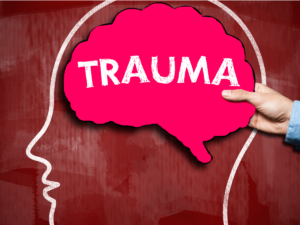Coping With Trauma
The word “trauma” is most often associated with situations of violence, war, or gruesome accidents—dramatic events where people experience post-traumatic stress and endure horrible pain. And while the use of the term “trauma” is correct here, that is not the only way trauma can present itself or be classified. The Diagnostic and Statistical Manual of Mental Disorders defines trauma as a mental, emotional and/or physical stress reaction that occurs after an event and can lead to feelings of shock, denial, anger, or numbness. Anyone can experience trauma and the reaction to a traumatic event is personal and subjective. What affects one person may not affect another person the same way. An event can happen once (like an assault) or can be a repeated occurrence (like neglect or abuse). Trauma, according to Dr. Timothy Legg of Medical News Today, is described as the reaction to an event, and not the event itself, suggesting that not all difficult or intense experiences may lead to trauma.
So, what happens after someone experiences a traumatic event? The response to trauma depends on the individual, so it is not clear or obvious how individuals will process their trauma. According to Principles of Trauma Therapy: A Guide to Symptoms, Evaluation and Treatment, people who have been through a trauma may face aversive emotional, physical, and psychological effects. Emotionally, they can either feel too much or too little, meaning that sometimes they may experience bursts of anger, frustration and/or shame, and other times they may feel almost nothing at all as a way to process and sort through their emotions. They may also experience excessive or inappropriate guilt, intrusive thoughts, depression, anxiety, stress, and moments of paranoia, fear, or misconstrued feelings of danger in situations that do not call for it. Physically, some common symptoms are sleep and eating issues, substance abuse, and respiratory problems. Hyperarousal may also occur, wherein the person’s body is in a constant “fight or flight” mode, which is mentally and physically exhausting and difficult.
Some of us have a loved one who has endured trauma; knowing how to support them is vital. How can you help? Recognizing that what they’re dealing with is painful and personal could help you offer support rather than judgement. If you feel that you cannot support them fully or kindly, stepping back and allowing others to help them instead may be better for their healing. If you do decide to help, check on your loved one often, but hear their feed- back: if they feel overwhelmed or don’t feel you are sup- porting them properly, do not take it personally. Adjust your communication or actions in order to best be there for them. On that note, the Better Health channel (a network of mental health services and articles) explains that as people process their trauma, they may feel anger, resentment, and frustration, and may take it out on you; this is normal; remind yourself to take these moments with a grain of salt. As you help, if you feel that everything you are dealing with is too much at times, don’t be afraid to gently place a boundary, so you do not harm yourself either. Helping others can be difficult if you are suffering.
There are some practical things you can do to help your loved one. Physical exercise can be very beneficial, so offer to go on walks with them, or sign up for some tennis lessons together, while others may process it best through art (do some painting together or hit up some museums). Helping them by talking about the event can be good, but some- times doing activities that help process the trauma without directly being about the trauma can be more approach- able and beneficial for your loved ones. Better Health recommends helping practically by offering a hand in tedious errands that can feel overwhelming to your loved ones, as it can help alleviate the load and allow them moments to breathe and process.
If you have experienced trauma, try and learn to give yourself some grace. There is no right way of dealing with trauma, and the pace you are going at is valid. Reach out to trusted family and friends for support, speak about your trauma when you feel comfortable, and try practicing some healing therapies like mindfulness, meditation, physical exercise, and psychological counselling.
– Nazila Tolooei
Visit amiquebec.org/sources for references
Sign up for our emails to stay in touch
Please also follow us on:



